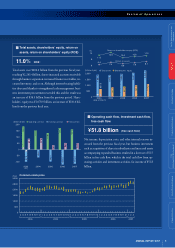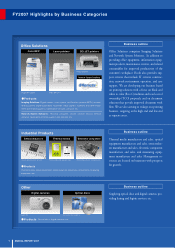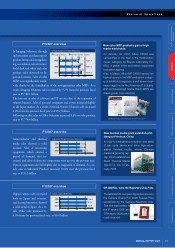Ricoh 2007 Annual Report Download - page 19
Download and view the complete annual report
Please find page 19 of the 2007 Ricoh annual report below. You can navigate through the pages in the report by either clicking on the pages listed below, or by using the keyword search tool below to find specific information within the annual report.
ANNUAL REPORT 2007
18
Highlights
Business Strategy
Corporate Governance
CSR
Environmental Management
Brand Communications To Our Shareholders and
Customers
Financial Section
Corporate Governance
Basic thinking on corporate
governance
The Ricoh Group, based on its corporate ide-
als and the spirit of strict conformance with the
law, approaches corporate governance with the
aim of securing management transparency and
strengthening its competitiveness, and works
for sustainable growth and expanding corporate
value. Ricoh sets its stakeholders as four groups
– customers, shareholders, employees, and soci-
ety – and make policies are made clear to each.
Ricoh uses the auditor system and, by strength-
ening the board of directors and through the ex-
ecutive officer system, Ricoh works to strength
top management and management execution.
Furthermore, by appointing directors from out-
side the company, Ricoh strives to secure trans-
parency and impartial decision making in top
management. The names, compensation, etc. of
directors and executive officers are studied and
decided by a unique standing organ, the "Nom-
ination and Compensation Committee."
Corporate governance internal control system diagram
Appointed/dismissed Appointed/dismissed
Accounting audits
Operations audits
Accounting audits
・Internal control system construction support
・Internal audits
Manager
Appointed/dismissed
General shareholders meeting
Group management committee Headquarters functions
Audit Office
Finance and Accouting Division
CSR Division etc.
Board of auditors
Board of
directors
Nomination and Compensation Committee
Outside director Inside director
Accounting auditor
Judges the appropriateness of
accounting audits
Affiliated companies
Business execution departments
Business execution departments
Business execution departments
Affiliated companies
Operations
audits
Basic policy of internal control system
The Company made the following revisions regarding basic policy on construction of internal control
systems at the Board of Directors’ Meeting held on April 25, 2007.
1. System to ensure the efficient implementation of directors’ duties and compliance with
laws and Articles of Incorporation
The company promotes a sense of alertness in execution of management and execution of business,
and in addition uses the following management structures in order to further improve its quality and
speediness.
① Management transparency and fairness of decision-making are strengthened by the presence of
outside directors.
② As part of the strengthening of management oversight functions by the Board of Directors, the
"Nomination and Compensation Committee,” a permanent organization composed of outside direc-
tors and resolutions concerning the regulation of the nomination, dismissal and compensation of
directors and executive officers, etc.
③ The executive officer system, its division of duties clarified, is speeding up the decision-making
process through the attribution of authority to each business division.
④ The “Group Management Committee” (GMC) is a decision-making organization delegated by the
Board of Directors, and composed of executive officers who meet certain qualifications. The GMC
operates so as to accelerate consideration and decision-making from the perspective of the opti-
mum management of the entire Group, concerning proposals on the most appropriate strategies for
direction of each business division and the entire Group, within the limits granted to it.
⑤ The “Disclosure Committee” is an independent organization that assures the accuracy, timeliness,
and comprehensiveness of disclosure of corporate information, and it performs checks on the pro-
cess for the production of disclosed information.
2. Systems related to the retention and management of information related to the imple-
mentation of directors’ duties
Records and proposals related decisions by directors in the course of their duties are collated and man-
aged in compliance with applicable laws, regulations and internal rules. Documents are kept so that
they can be retrieved and produced in response to request from directors and corporate auditors.
3. Regulations and other structures regarding risk management for losses
① The occurrence of losses shall be proactively prevented based on regulations for risk manage-
ment.
② Should losses nevertheless arise, efforts shall be made to minimize damage (loss) based on stan-
dards for initial reaction.
③ In order to manage losses as a Group, comprehensively and in a unified fashion, a division respon-
sible for integrated management will be created that will thoroughly cover all aspects globally.
4. Systems to ensure appropriate compliance with laws, and Articles of Incorporation
concerning the performance of employee’s duties.
① In order to thoroughly implement the "Ricoh Group CSR Charter”, which sets forth the principles
of corporate behavior with regard to CSR including compliance, and the “Ricoh Group Code of
Conduct", which shows the general rules of conduct for Ricoh Group employees, the Special
Committee is in the process of setting up a "Hot Line" for reporting incidents and seeking advice,
worldwide, and provides training. Every effort is being made to enhance compliance domestically
and overseas.
② Efforts are being made to improve business processes and construct a framework for standardized
internal control throughout the entire Ricoh Group, with the goal of “complying with laws, norms,
and internal rules,” “improved of business effectiveness and efficiency,” “maintaining high reliability
of financial reporting,” and “preservation of assets,” including compliance to the section 404 of the
Sarbanes-Oxley Act of 2002, financial product transaction laws, and other laws and regulations.
③ For internal auditing, an internal auditing department shall perform fair and objective examination
and evaluation of how each division is executing its business based on legal compliance and ratio-
nal criteria, and provide advice or recommendation for improvement.
④ Ricoh has established a special department for strengthening and enhancing the functions of ①, ②,
and ③ above in a unified manner. Also, in order to construct and improve the internal control sys-
tem of the Group, an "Internal Control Committee" that meets periodically to deliberate and decide
on these matters has been established within the Group Management Committee (GMC).
5. Systems to ensure correct business standards in the Ricoh group composed of the
company and its affiliates
Ricoh and each affiliate in the Ricoh Group shall devise a system that will ensure the adherence to cor-
rect business standards to improve business performance and enhance the prosperity of each Group
company, while keeping mutual respect for their independence, as follows:
① The company's board of directors and the “Group Management Committee” (GMC) make decisions
and perform management oversight for the Ricoh Group as a whole. To ensure the efficacy of
such efforts, they establish management regulations concerning affiliated companies, and set up
relevant administrative organization in order to manage the Group.
② The “Ricoh group Standard” (RGS) represents a set of common rules to be followed by the entire
Group.
6. Matters regarding employees whom auditors request to assist them in the performance
of their duties
Internal Audit system shall be established to assist work duties through directives from auditors, and to
select employees who shall assist the auditors in their work.
7. Matters related to the independence of auditors’ staff from directors described in No.
6 above
When an employee (as in No. 6 above) assists auditors in their work, he or she shall not be subject
to order given by directors. In addition, decisions concerning personnel assessments or personnel
changes regarding said employees shall be made only after hearing the opinions of the auditors.
8. Systems to enable directors or employees to report to auditors, and other systems
related to reporting to auditors
Directors or employees shall report to auditor matters concerning laws and regulations, as well as "im-
portant matters decided by directors which affect the entire company," "the results of internal audits,"
"the status of reporting via the internal reporting system," and "matters which auditors have sought
report about."
9. Systems established to ensure the efficacious performance of auditing responsibili-
ties by auditors
Auditors shall perform audits thoroughly by attending the board of directors meeting and man-
agement meetings, receiving reports on exercise of function from the directors and executive
officers, reviewing important resolution documents, and investigating the status of operations of
division and group companies.
























